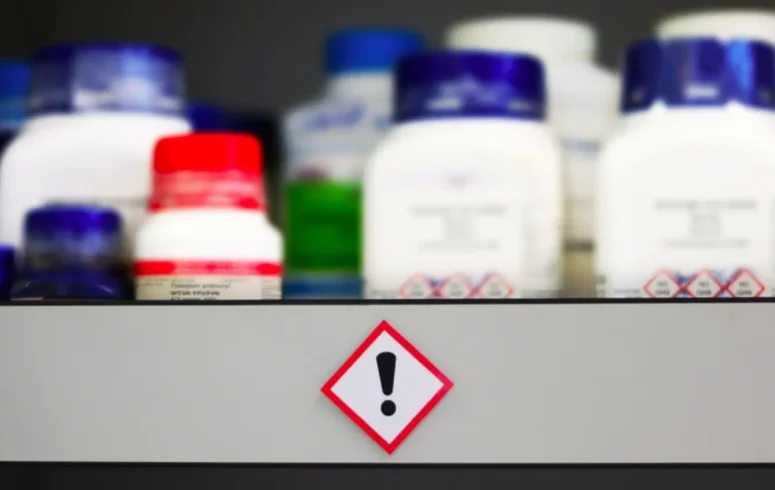Toxic Exposure
Representing Individuals Harmed by Exposure to Hazardous Substances Due to Defective Products
Contact Simon Law to schedule your free case evaluation.
Toxic Exposure Attorneys at Simon Law
At Simon Law, we advocate for individuals who have suffered health issues due to exposure to dangerous substances from defective products. We have extensive experience handling cases involving harmful chemicals, pollutants, and other toxic materials that pose significant risks to human health.
Our dedicated legal team is committed to thoroughly investigating each case, identifying responsible parties and pursuing maximum compensation for medical expenses, lost wages, and pain and suffering. With a strong track record of success and a client-focused approach, Simon Law offers the expertise and support needed to navigate the complexities of toxic exposure claims and achieve justice for our clients.

About Toxic Exposure
Toxic exposure occurs when individuals come into contact with harmful chemicals or substances that can lead to serious health problems. These substances can be found in various environments, including workplaces, homes, and consumer products. Common toxic substances include asbestos, lead, pesticides, solvents, and industrial chemicals. Exposure can happen through inhalation, ingestion, or skin contact, and the effects can range from acute symptoms like respiratory issues and skin irritation to long-term conditions such as cancer, neurological disorders, and organ damage. Understanding the sources and risks of toxic exposure is crucial for preventing harm and seeking appropriate legal recourse if exposure occurs due to negligence or defective products.
What are the Common Sources of Toxic Exposure?
Common sources of toxic exposure include a variety of environments and substances:
- Workplaces: Industrial settings, construction sites, and factories often involve exposure to hazardous chemicals such as asbestos, benzene, silica, and heavy metals. Workers in these environments may come into contact with toxic fumes, dust, or liquids.
- Homes: Household products like cleaning agents, pesticides, and lead-based paints can pose risks. Mold and asbestos in older buildings are also common sources of toxic exposure.
- Consumer products: Defective or improperly labeled products, such as cosmetics, electronics, and children’s toys, can contain harmful substances like phthalates, formaldehyde, and BPA.
- Environmental contaminants: Pollution from industrial plants, agricultural runoff, and contaminated water sources can lead to toxic exposure. This includes exposure to chemicals like dioxins, PCBs, and pesticides.
- Medications and medical devices: Some pharmaceuticals and medical devices have been found to contain toxic substances or materials that can cause adverse health effects.
- Food and beverages: Contaminated food products or packaging can introduce harmful chemicals like BPA, pesticides, and heavy metals into the body.
What Health Issues Can Result From Toxic Exposure?
Toxic exposure can lead to a wide range of health issues, depending on the type and duration of exposure, as well as the individual’s susceptibility. Common health issues resulting from toxic exposure include:
- Respiratory problems: Inhalation of toxic fumes or particles can cause respiratory issues such as asthma, chronic bronchitis, and lung damage. Long-term exposure can lead to more severe conditions like pulmonary fibrosis or lung cancer.
- Skin conditions: Contact with toxic substances can cause skin irritation, rashes, and chemical burns. Prolonged exposure can lead to dermatitis or other chronic skin conditions.
- Neurological disorders: Certain chemicals, such as lead and mercury, can affect the nervous system, leading to symptoms like headaches, dizziness, cognitive impairments, and in severe cases, neurological disorders like Parkinson’s disease or multiple sclerosis.
- Gastrointestinal issues: Ingesting toxic substances can result in nausea, vomiting, abdominal pain, and diarrhea. Chronic exposure can lead to more serious conditions, such as liver and kidney damage.
- Reproductive and developmental problems: Exposure to certain toxins, like phthalates and pesticides, can affect reproductive health, leading to infertility, birth defects, and developmental delays in children.
- Cardiovascular issues: Some toxic substances can impact the cardiovascular system, causing conditions such as hypertension, heart disease, and increased risk of strokes.
- Cancer: Prolonged exposure to carcinogenic substances, such as asbestos, benzene, and certain pesticides, can significantly increase the risk of developing various types of cancer, including lung, liver, and bladder cancer.
- Endocrine disruption: Chemicals like BPA and dioxins can interfere with the endocrine system, leading to hormonal imbalances, thyroid problems, and metabolic issues.
- Immune system disorders: Toxic exposure can weaken the immune system, making individuals more susceptible to infections and autoimmune diseases.
Recognizing and addressing these health issues early is essential for effective treatment and minimizing long-term damage. If you suspect you have been exposed to toxic substances, seeking medical and legal assistance is crucial.
How Can I Prove that My Health Issues Were Caused by Toxic Exposure?
Proving that your health issues were caused by toxic exposure can be complex and requires a combination of medical evidence, expert testimony, and thorough documentation. Here is what is typically involved:
- Medical records: Obtain detailed medical records that document your diagnosis, symptoms, and treatment. These records should clearly outline the health issues you are experiencing.
- Exposure history: Create a comprehensive timeline of your exposure to the toxic substance. Include details such as the location, duration, and manner of exposure. Document any work environments, products used, or specific incidents where exposure occurred.
- Scientific evidence: Gather scientific studies or research that link the toxic substance to the health issues you are experiencing. This evidence helps establish a connection between the exposure and your medical condition.
- Expert testimony: Engage medical and environmental experts who can provide professional opinions on your case. Medical experts can testify about the likelihood that your health issues were caused by the toxic exposure, while environmental experts can discuss how the substance can lead to such health problems.
- Witness statements: Collect statements from coworkers, family members, or others who can corroborate your exposure history and the impact on your health. Their testimonies can support your claims and provide additional context.
- Occupational or environmental reports: Obtain reports or records from regulatory agencies, employers, or environmental assessments that document the presence of the toxic substance in the relevant environment. This can include safety violations, contamination reports, or inspection results.
- Personal records: Keep personal records of your health history, including any changes in your condition and the progression of symptoms. Journals, photographs, and notes can help illustrate the impact of the exposure on your daily life.
- Legal assistance: Work with an experienced attorney who specializes in toxic exposure cases. They can help gather evidence, identify liable parties, and build a strong case to prove the connection between your health issues and the toxic exposure.
By compiling this comprehensive evidence, you can establish a clear link between your health issues and toxic exposure, which is crucial for pursuing compensation and holding responsible parties accountable.
Who Can Be Held Liable for Toxic Exposure Injuries?
Several parties can potentially be held liable for toxic exposure injuries, depending on the specific circumstances of the case:
- Manufacturers and distributors: Companies that produce, distribute, or sell products containing toxic substances can be held liable if their products caused the exposure. This includes manufacturers of chemicals, pesticides, pharmaceuticals, and consumer goods.
- Employers: Employers have a legal duty to provide a safe work environment. They can be held liable if employees are exposed to toxic substances due to inadequate safety measures, improper training, or failure to comply with health and safety regulations.
- Property owners and landlords: Owners of property where toxic substances are present or used, such as rental properties, industrial sites, or agricultural land, can be held liable for failing to prevent exposure or properly warn occupants.
- Contractors and subcontractors: Construction companies and subcontractors may be held liable if their work activities lead to toxic exposure, such as improper handling or disposal of hazardous materials like asbestos or lead.
- Government entities: Government agencies responsible for regulating environmental standards, workplace safety, or public health may be held liable if they fail to enforce regulations or adequately respond to known hazards.
- Healthcare providers: In cases involving medical malpractice related to toxic exposure, healthcare providers who misdiagnose or fail to properly treat exposure-related health issues may be held liable.
- Third parties and suppliers: Suppliers or equipment, safety gear, or materials used in environments where toxic exposure occurs may also bear liability if their products contribute to the exposure.
Determining liability in toxic exposure cases often requires a detailed investigation to identify the source of the exposure, establish negligence or misconduct, and gather evidence linking the exposure to the resulting injuries. An experienced attorney specializing in toxic tort litigation can assist in navigating these complexities and holding the responsible parties accountable.
What Kind of Compensation Can I Receive for Toxic Exposure Injuries?
Victims of toxic exposure injuries may be eligible to receive various types of compensation, depending on the circumstances of their case and the extent of their injuries. Compensation typically covers:
- Medical expenses: This includes past and future medical bills related to treating the injuries caused by toxic exposure. It may cover hospital stays, surgeries, medications, rehabilitation, and therapy.
- Lost wages: If the injuries prevent you from working or result in reduced earning capacity, you may receive compensation for lost wages and income.
- Pain and suffering: Compensation for physical pain, emotional distress, and mental anguish caused by the injuries and their impact on your life.
- Disability and impairment: If the injuries lead to permanent disability, impairment, or loss of quality of life, compensation may be awarded to reflect these long-term consequences.
- Loss of consortium: In cases where toxic exposure affects personal relationships, compensation may be available for the loss of companionship, support, or intimacy with a spouse or family member.
- Punitive damages: In cases involving extreme negligence or intentional misconduct by the responsible party, punitive damages may be awarded to punish the wrongdoer and deter similar conduct in the future.
- Legal fees and costs: Depending on the outcome of the case, compensation may include reimbursement for attorney fees, court costs, and expenses incurred during the legal process.
The specific amount of compensation awarded can vary based on factors such as the severity of the injuries, the impact on your life and livelihood, and the legal arguments presented in the case.
What Should I Do If I Suspect I Have Been Exposed to Toxic Substances?
If you suspect you have been exposed to toxic substances, it’s important to take prompt action to protect your health and legal rights. Here are the steps you should consider:
- Seek medical attention: First and foremost, seek medical evaluation and treatment from a healthcare professional experienced in toxic exposure. Explain your symptoms and any known or suspected exposure incidents. Prompt medical attention can mitigate potential health risks and establish documentation of your condition.
- Document the exposure: Record details of the suspected exposure, including the date, time, location, and circumstances surrounding the event. Note any symptoms or health effects you experience afterward. This documentation can be crucial for future legal and medical purposes.
- Report the exposure: Depending on the situation, report the suspected exposure to relevant authorities or regulatory agencies. This could include your employer (if exposure occurred at work), local environmental health departments, or occupational safety agencies. Reporting ensures that appropriate investigations and corrective actions can be taken.
- Preserve evidence: Preserve any physical evidence related to the exposure, such as contaminated clothing, product packaging, or environmental samples. Take photographs, if possible, to document the conditions at the time of exposure.
- Consult with an attorney: Contact an experienced attorney who specializes in toxic tort litigation. They can provide legal guidance, evaluate your case, and help determine if you have grounds for a legal claim. An attorney can also advise you on your rights, potential compensation, and the legal steps needed to protect your interests.
- Follow medical advice: Follow the treatment plan prescribed by your healthcare provider. Attend follow-up appointments and adhere to recommended therapies or medical monitoring to monitor any long-term health effects from the exposure.
- Document expenses: Keep records of all medical expenses, including bills, prescriptions, and related costs. Also, keep track of any missed workdays or reduced earning capacity due to your health condition.
By taking these proactive steps, you can safeguard your health, gather important evidence, and position yourself to pursue legal recourse if the toxic exposure leads to significant harm or damages.
Meet Our Dedicated Team of Attorneys
When you need qualified and reliable guidance, you know where to turn. Simon Law is ready to listen to your story and review the complex aspects of your case.










Contact Our Firm Today
Our mission is to provide the highest-quality legal services with integrity, professionalism, and respect for our clients. Simon Law has the resources and expertise to handle your case without sacrificing the personalized counsel and support you deserve.